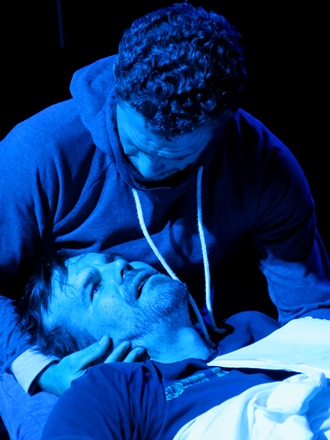
Surprising histories: The arts and social health of returning military personnel
- 7 Oct 2015
Michael Balfour is the Professor and Chair of Applied and Social Theatre at Griffith University whose research is in the social applications of theatre. For Mental Health Week, we asked Michael to write about his work using arts-based approaches to explore the issues facing returning military personnel:
Over the last couple of years thousands of military personnel from USA, UK, Europe and Australia have returned from Afghanistan and the conflict in Iraq. Between 18-30% of those returning from war zones to civilian life can be expected to suffer mental health issues, which can lead to family breakdown, homelessness and other problems. One of the features of returning military personnel dealing with issues of transition and Post Traumatic Stress (PTS) is the length of time it takes to seek help from a medical professional or support organisation. Typically this can be from 5-8 years in which time there is a heavy impact on relationships, personal mental health and professional capacity.
The Difficult Return was an arts-based response to this issue and involved collaboration between arts, public health and military researchers at Griffith University, University of Queensland and Chapman University, California. The project, funded by the Australian Research Council, developed practice in three areas:
- Awareness – online digital films uploaded for viewing by returned military personnel and their families
- Motivation – the development of The Return, a documentary theatre piece featuring ex-servicemen and actors
-
Action – an applied counselling program that used elements of role-play and enactment, in partnership with the University of British Columbia, Canada
This was a broad-based approach to using the arts in a number of different ways to build awareness, to motivate discussion and help-seeking, and to research and develop alternative modes of supporting transition to civilian life. The project used songs,  social media, films distributed via YouTube, documentary theatre and role-play enactments with groups.
social media, films distributed via YouTube, documentary theatre and role-play enactments with groups.
Part-time diplomat and folk singer Fred Smith was commissioned to write ‘Going Home’ (released as the Australian Defence Force (ADF) started the first drawdown of the troops in Afghanistan) to capture the sentiments of military personnel getting ready to pack up and the exhilaration and fear of coming home. The song was released on multiple MP3 platforms and as a YouTube video and was shared and liked by thousands of people. All proceeds went to Mates4Mates, a new veteran support charity. As a public health tactic it was designed to travel and get shared via Facebook and other social networks. We weren’t interested in it going ‘viral’ – we wanted it to be shared widely among a specific audience of military personnel and their families. We were told that the song was used as an emotional postcard to families as it perfectly encapsulated what they couldn’t describe. Since being launched in 2013 the song has achieved 10,569 hits, modest in YouTube terms, but given the ADF consists of 80,000 personnel and about 1600 were deployed to Afghanistan, this is quite a strong reach. The geographic impact has been broad with views in Australia, Afghanistan, Iraq, Germany and the United States.
The benefit of digital arts projects like ‘Going Home’ is that they allow participants to access content in their own time. The current cohort of military personnel has been described as the “laptop generation” (Smith, 2015) because their leisure time is spent sitting in groups or individually sharing online material, swapping links, using Skype and playing video games. Even on deployment, the Internet is a link back to normality. These habits continue on return and are therefore an important access point for health professionals to tailor the message in a way that appeals to a target audience. We also learnt that it’s often the partners who are accessing mental health sites and information, as a way to try to understand and seek help for people they know experiencing the difficulties of return and transition.
The purpose of The Return, written and directed by Linda Hassall, was to build on the kind of awareness generated by the song, and to develop a deeper engagement with the affective realities of living with PTS. The play was performed by a cast of actors and ex-military personnel and principally designed for military and ex-military audiences. After nearly two years of research and development, the play was performed in Brisbane to three sold out performances in June 2014. In the post show forums audience members described the effect as cathartic, with partners describing how the show had given them an insight into how and why their husbands felt and behaved like they did. The presence of ex-military personnel in the cast added a level of authenticity and offered hope to many of the military personnel in the audience that managing PTS was possible.
One of the key reflections from the project is the importance of the centrality of an audience in the way we design and construct art projects. Military and ex-military people tend to be a little suspicious of civilians in general, and of artists, perhaps even more so. It takes time to build up trust, develop insight, and collaborate with specific communities but the time it takes is a critical investment in creating imaginative projects that have resonance, connection and relevance. The sustainability of an initiative is also deeply linked to the strength of how well the project links with existing groups and associations. The powerful work of community organisations like Young Diggers, Mates4Mates, Wishing, Stand Tall for PTS, Whiskey’s Wish and the formal institutions like the RSL, Department of Veteran Affairs and ADF mean that while there are contested views on how to treat and support PTS, there is now at least a variety of options and alternatives for military and ex-military personnel to select from to gain help and support.
For Further Support
Veterans & Veterans Families Counselling Service (VVCS)
VVCS is a specialised, free and confidential counselling service for Australian veterans and their family. You do not need to hold a DVA entitlement card to use the services of VVCS.
Ring VVCS on 1800 011 046 (free 24 hours, 7 days).
 Michael Balfour is Professor and Chair of Applied and Social Theatre at Griffith University, Brisbane. Michael’s research is in the social applications of theatre. He has worked on international studies exploring arts–based work with returning veterans, performances in sites of war and conflict, performing arts practice in prisons and correctional facilities, and with newly arrived refugees in Australia.
Michael Balfour is Professor and Chair of Applied and Social Theatre at Griffith University, Brisbane. Michael’s research is in the social applications of theatre. He has worked on international studies exploring arts–based work with returning veterans, performances in sites of war and conflict, performing arts practice in prisons and correctional facilities, and with newly arrived refugees in Australia.
Twitter: balfour_michael
Contact: m.balfour@griffith.edu.au
Featured image: Scene from The Return by Linda Hassall. Image courtesy Michael Balfour.

